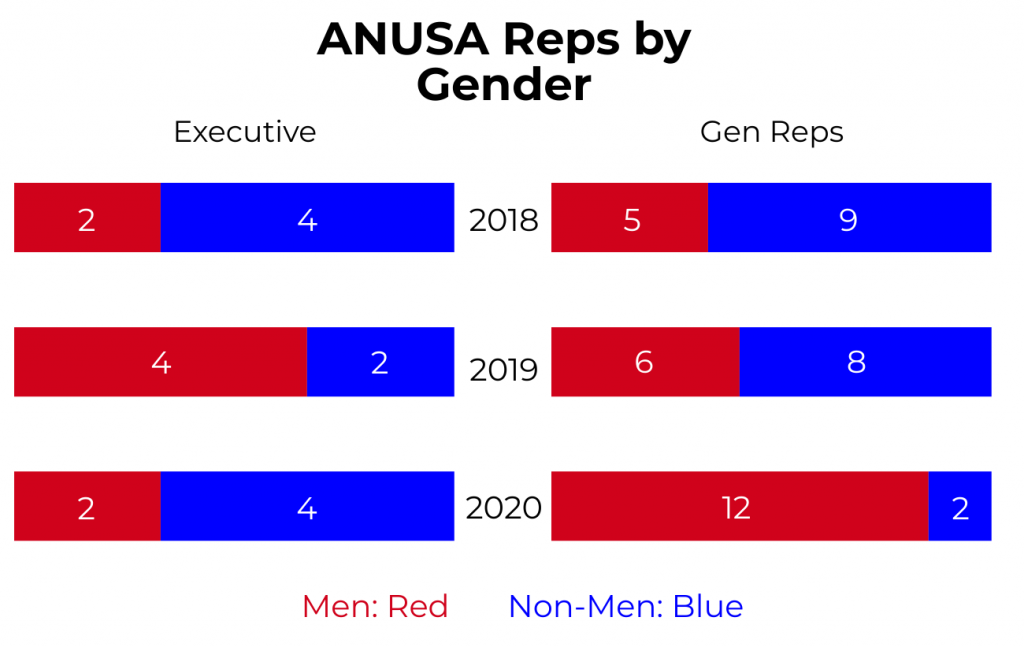ANUSA Affirmative Action Proposal Criticised for Lack of Consultation

By Brandon How
A potential gender-based affirmative action (AA) policy was debated at the ANUSA Annual General Meeting (AGM) last Thursday. Although initially intended only as a “discussion item”, a motion to “note” a proposed AA policy was voted down amidst criticism of a lack of consultation with the ANUSA departments before it was brought to the AGM. A Gender Equality Working Group was also established at the meeting to, among other aims, “figure out how an AA mechanism (if appropriate as a solution) would work”.
The proposed AA policy would place a limit on the number of candidates of the same gender that can be elected to the fourteen General Representative (Gen Rep) positions within ANUSA. In its current form, the proposed policy effectively places a limit on the number of nominees of the same gender that can be elected as Gen Reps at eight – or a little under 60% of the total number of Gen Reps.
For the policy to operate, nominees would need to disclose their gender identity to the Returning Officer. Although the preamble of the motion made reference to cis-males, the proposed regulatory amendment did not specify any particular gender that the limit would apply to. Despite the lack of support for the specific policy proposed, students at the AGM expressed their broad support of the implementation of an AA policy in some form.
Affirmative action, amongst other support mechanisms for women and non-binary students, will be discussed at forthcoming Gender Equality Working Group meetings. The group’s first meeting will be convened by Women’s Officer Siang Jin Law and its findings will be reported at SRC meetings as a part of the Women’s Officer report. A secretary to the Working Group will be elected at the first meeting. Law said at the AGM that she was hopeful that some measures will be implemented “for [the election] next year”.
Speaking to Observer, Law emphasised that the purpose of the Working group was to “gather data on the dynamics creating the gender inequality” amongst ANUSA representatives. Law said that additional information on the Working Group will be posted on the Women’s Department and ANUSA Facebook pages “before the end of Semester 1”. The AA motion was moved by Clubs Council Secretary Jordyn Gibson, who invited students at the AGM to attend the Working Group, and to share their thoughts on the policy with her.
This proposed policy was a response to the lack of gender diversity amongst General Representatives elected in 2019. Only 2 of the 14 General Representatives serving this year are women. Aryanne Caminschi, one of the two, said that the gender imbalance made her feel “more pressure” on herself to represent women. In the ANUSA Elections held in August last year, three of the four Gen Rep Candidates named ‘Ben’ were elected, and two other Gen Rep candidates named ‘Nick’ were also elected. This is the first time since 2015 in which more male identifying candidates were elected than the total number of non-male identifying nominees.

Graphic by Brandon How
Speaking to Observer, the seconder for the affirmative action motion, Georgette Mouawad, described the 2019 result as “unfair,” noting that “48% of the nominees were not male”. Mouawad also highlighted the issue of inequality in the election results, questioning “how one could look at the current representatives and not think the ANU has an implicit misogyny problem”. In 2019, Mouawad ran for a General Representative position with the Electrify ticket, but was not elected.
The main criticism leveled against the AA policy was the inadvertent disadvantage it might impose on other marginalised groups. Vincent Li, the only international student elected as a Gen Rep in the 2019 election, contended that the policy would create a “hierarchy between different marginalised groups”. Li said that if this policy had been in place last year, there would be “no international students” serving as Gen Reps. Bruce Hall Community Coordinator Kazimier Lim echoed the need for a more representative policy, noting that international students make up “27% of the undergraduate population”. In light of this, ISD Officer, LC Yip, expressed her concern to Observer over the “consistent lack of international student representation on the SRC and gen reps throughout the years”.
Lim also noted that a number of queer representatives elected last year would have been potentially disadvantaged by the proposed policy. When approached for comment after the meeting, Disabilities Officer Zoe Ranganathan voiced concerns she has over the increasing representation for those with disability. Additionally, she noted her difficulty in convening the ANUSA Disabilities Action Plan Committee due to a lack of interest within the SRC.
As the motion went to a vote Gibson reminded attendees of the AGM that the policy proposal was still “at an incredibly early stage” of development and asked people not to accuse supporters of it as deliberately exclusionary. When approached for comment by Observer, Gibson pointed out that “AA is a common policy in ANUSA” which is implemented on “many department boards” and “in elections for deputies”. In response to concerns regarding potential adverse impacts of the policy on other groups, Mouawad also defended the motion. She argued that “race-based aid doesn’t help women of colour, gender-based aid does”.
Many Department Officers also expressed frustration that the policy had not undergone sufficient consultation, and had not been made through a Working Group. Although it had been discussed at meetings of the Election Regulations Working Group, and presented to the Women’s Department twice, the Queer*, Ethnocultural, International Student’s, Disabilities, and Indigenous Departments had not been consulted prior to the AGM. Queer* Department Officer Aisling Arnould reminded the movers of the motion that “whilst you don’t have to bring it to the collective, you can speak to the officer”. Speaking to Observer, Arnould noted the importance of including “trans and gender diverse voices in this discussion”. Furthermore, Arnould confirmed that the proposed motion would be discussed “in detail” at the next Queer* Department meeting on Tuesday 26 May.
Several Officers shared their concerns when approached by Observer. In terms of consultation with the Women’s Department, Law said that despite being “provided with the policy in its full form” she was “unsure to what extent the feedback changed the overall policy” before it was presented at the AGM. Yip shared Law’s “disappointment”, noting that it would be “excluding communities if implemented without proper consultation and revision to the existing proposal”. Ranganathan echoed this sentiment, stating that any policy, “particularly one that affects marginalised groups”, should be subject to “rigorous” debate and amendments “before it is even proposed to the SRC”.
Speaking at the AGM, Ranganathan stated that it was “important we are not virtue signalling” about the issue of affirmative action, and emphasised the need for amendments and further consultation with ANUSA’s autonomous departments. She emphasised the need for consultation with other marginalised groups, stating that the failure to put the proposal “through the Working Group…is saying we value gender diversity over other groups”.
Gibson defended the motion in response to these concerns at the AGM, stating that “we have to do something about the problem right now” and that “something to improve diversity on the SRC” is better than “nothing”. Speaking to Observer, Gibson clarified that “the aim of bringing this discussion to the AGM was to conduct more consultation”. Furthermore, she suggested that “not everyone feels welcome in departments” and emphasised the importance of having “big policies like this consulted in a way that is public and open to a large group of people”, such as at the AGM. Ultimately, Gibson was “largely happy with the discussion that was had” and is “incredibly proud of everyone that’s been working on” the proposed AA policy.
At the AGM, Caminschi further contended that any “investigation” into a diversity policy should not be confined to just the General Representatives, citing that in previous years it was the executive that was non-diverse. In 2017, Observer reported that ANUSA had launched a Working Group to conduct a diversity review of the ANUSA executive, although did not lead to any AA policy being implemented.
The Indigenous Department Officer was contacted for comment.
The ANUSA President, Education Officer and CASS Representatives were contacted for comment.
Know something we don’t know? Email [email protected] or use our anonymous tip submission.
If you have an issue with this article, or a correction to make, you can contact us at [email protected], submit a formal dispute, or angery react the Facebook post.
Want to get involved? You can write articles, photograph, livestream or do web support. We’re also looking for someone to yell “extra!” outside Davey Lodge at 1AM. Apply today!









